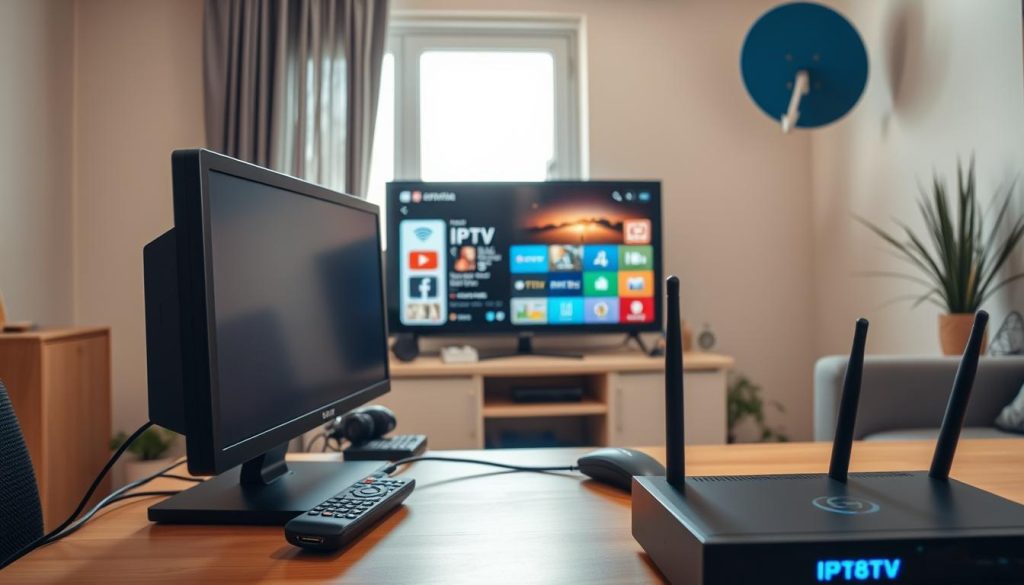Can you stream your favorite shows and movies in high-definition using IPTV satellite internet? What are the requirements for a seamless viewing experience with IPTV streaming services and satellite TV providers?IPTV services are getting more popular. Providers like IPTV Subscription Shop and KAPtv offer high-quality, 4K & HD channels. They work with all devices and have 99% uptime, with no freezing. This makes them a top choice for a great IPTV experience with satellite internet packages1.A fast internet connection with at least 25 Mbps is needed for U.bc streaming of IPTV content2.
Table of Contents
ToggleKey Takeaways
- IPTV satellite internet lets users stream high-quality content with IPTV streaming services. Strong internet connection is necessary for IPTV streaming with satellite internet packages.
- IPTV subscription providers like IPTV Subscription Shop and KAPtv offer premium channels and reliability.
- IPTV services are becoming increasingly popular, with many households using IPTV services as of 20221.
- The average cost for IPTV services generally ranges from $20 to $100 per month, depending on the package and features1.
- Multiple TV sets can utilize a single IPTV subscription, potentially saving an average household approximately 30% on monthly service costs1.
Understanding IPTV and Satellite Internet Technology
IPTV technology has changed how we watch TV, offering many channels and services online. It started in the late 1990s and grew fast with the spread of broadband internet3. Now, we have live TV, video-on-demand, and time-shifted TV. IPTV uses special players to show content, and services can be with or without apps.
Satellite internet is key for IPTV streaming, giving a fast and reliable connection for smooth watching. It’s important for delivering IPTV content, even where regular internet is not available. Using IPTV with satellite internet means more channels, better quality, and watching TV anywhere, anytime. About 45% of U.S. homes now use IPTV instead of traditional cable3.
IPTV needs a fast internet connection for good streaming. It needs at least 5 Mbps for standard definition and 25 Mbps for high definition3. IPTV is also cheaper, saving 30-50% compared to cable. As IPTV becomes more popular, knowing its tech and how it works with satellite internet is key for a great streaming experience.
Essential Requirements for IPTV Satellite Internet Setup

To enjoy IPTV streaming, a fast internet connection is key. You need at least 25 Mbps for UHD streams and 10 Mbps for standard quality4. You also need a compatible device, like a smart TV or streaming device. Plus, a good IPTV provider is important for access to many channels and support.
IPTV changes how we watch TV, offering live and on-demand content5. The IPTV market is expected to grow fast, at a CAGR of about 15.3% from 2022 to 20305. With the right setup, devices, and internet, you can enjoy top-notch streaming. A good internet connection and a compatible device are just the beginning. You also need a reliable IPTV provider to complete the setup5.
Choosing the Right Satellite Internet Package for IPTV
When picking a satellite internet package for IPTV, think about speed, data limits, and streaming issues. For IPTV, you need at least 25 Mbps for UHD and 10 Mbps for standard quality6. Also, data limits and streaming issues can impact your viewing quality. Some providers offer unlimited data, while others have limits that might cut into your streaming time.
Do your homework and compare different providers to find the best IPTV package. Consider speed, data limits, cost, and customer service. The right package ensures a smooth IPTV experience with less buffering6.
Top IPTV Service Providers and Their Features

Choosing the best IPTV providers can be tough. Several stand out for their premium channels, device support, and pricing. IPTV Subscription Shop and KAPtv are two top choices. They offer a wide range of 4K & HD channels, including sports, movies, and TV shows8.
Popular streaming devices like Amazon Fire TV and Chromecast with Google TV are often supported. The level of support for advanced features varies9.
IPTVSubscriptionShop: Premium 4K & HD Channels
KAPtv: Reliability and Device Compatibility
Comparing Provider Plans and Pricing
Setting Up Your IPTV Satellite Internet Connection

To start using IPTV on devices like smart TVs and smartphones, follow a few easy steps. First, download and install the IPTV app. Then, enter your IPTV provider’s login details. Lastly, pick the channels and content you want to watch. This whole process takes just a few minutes11.
Having a stable satellite internet connection is key for smooth IPTV streaming. You’ll need at least 15 Mbps for standard definition and 25 Mbps or more for high definition12.
Choosing a device for IPTV is easy, with options like Amazon Firestick being popular for their ease of use13. Setting up IPTV on these devices is straightforward. Most streaming devices support IPTV apps, giving you access to thousands of channels and content. IPTV is a great alternative to traditional cable TV, offering sports, news, and entertainment11.
IPTV services come with flexible subscription plans, often cheaper than cable TV11. Many providers also offer a 24-hour free demo. This lets you try the service before you buy11. With the right satellite internet connection and device, IPTV streaming is seamless. It’s a reliable and affordable way to enjoy entertainment.
Optimizing Your IPTV Streaming Experience
To make your IPTV streaming better, think about buffer management, quality settings, and bandwidth control. Changing these can cut down on buffering and boost streaming quality. This makes watching videos more fun14.
Adjusting the buffer size and using a buffer tool can stop interruptions. This ensures your stream runs smoothly.
Quality settings, like video quality and bitrate, are key for a good IPTV experience. Choosing the right settings balances video quality and bandwidth. This keeps your stream stable and high-quality15.
IPTV streaming works well on managed networks. These networks offer better reliability and quality than OTT’s public internet15.
Troubleshooting Common IPTV Satellite Internet Issues
When you face connection problems with IPTV satellite internet, finding the cause is key. A download speed of 7-10 Mbps and an upload speed of 1-3 Mbps are recommended for IPTV16. Try restarting your device, checking your internet, and tweaking your quality settings to fix issues.
Weather can also mess with your IPTV streaming. Heavy rain or snow can weaken the signal. Use a signal booster or adjust your dish to boost the signal. About 30% of IPTV problems come from slow or unstable internet17. Make sure your internet is fast enough for streaming, with at least 3 Mbps for SD and 25 Mbps for HD17.
To improve performance optimization, adjust the buffer size and use buffer management tools. For basic streaming, you need 1.5 Mbps, and for Ultra HD, 25 Mbps16. By following these tips and keeping your internet stable, you’ll enjoy smooth IPTV streaming. Restarting your IPTV device fixes TV guide errors in about 50% of cases17.
Understanding common IPTV satellite internet problems helps you troubleshoot and optimize. This way, you can reduce weather-related disruptions and stream in high quality. If other methods fail, contacting IPTV service providers can solve up to 70% of TV guide errors17. With the right tools and knowledge, you can overcome these issues and have a better viewing experience.
Future of IPTV Satellite Technology
The future of IPTV satellite technology looks bright with new tech advancements. These include better streaming quality, more availability, and cool new features18. As more people want IPTV, satellite providers will keep improving. They aim to make streaming better and offer more content.
The IPTV market is set to grow fast, with a 15% annual increase from 2021 to 202618. This growth is thanks to more internet users and a love for on-demand shows.
Conclusion
IPTV and satellite internet together look promising for the future of entertainment. IPTV brings live TV and on-demand content through IP networks. Satellite internet offers wide coverage and reliability, making a great combo for streaming21.
As the digital world changes, IPTV and satellite TV will serve different needs. They will meet the varied tastes of today’s viewers22.
FAQ
What is IPTV and how does it work?
IPTV uses the internet to send TV channels and videos to users. It doesn’t need cable or satellite TV. Instead, it streams content to devices like smart TVs and phones.
How does satellite internet play a role in IPTV streaming?
Satellite internet gives a fast and reliable connection for IPTV. It lets users watch a lot of channels and content. This includes live TV, movies, and sports in high quality.
What are the essential requirements for setting up IPTV with a satellite internet connection?
You need a device like a smart TV, a fast satellite internet, and a good IPTV provider. Providers like IPTV Subscription Shop or KAPtv are recommended.
What should I consider when choosing a satellite internet package for IPTV?
Look at the speed, data caps, and streaming limits. Some plans offer unlimited data, while others have limits. This affects your streaming quality.
What are the top IPTV service providers and their key features?
IPTV Subscription Shop and KAPtv are top providers. They offer many channels and are easy to use. They’re great for a quality IPTV experience.
How do I set up IPTV on different devices?
Download and install the IPTV app. Enter your provider’s details and choose channels. It’s easy and quick.
How can I optimize my IPTV streaming experience?
Use buffer management and adjust quality settings. Controlling bandwidth helps too. A VPN can also improve streaming by reducing latency.
What common IPTV satellite internet issues can I troubleshoot?
Issues include connection problems and weather disruptions. Try restarting your device and checking your internet. Adjusting settings and using a signal booster can help.
What is the future of IPTV satellite technology?
The future will bring better streaming quality and more availability. As demand grows, providers will invest in new tech. This will enhance the streaming experience and offer more content.


